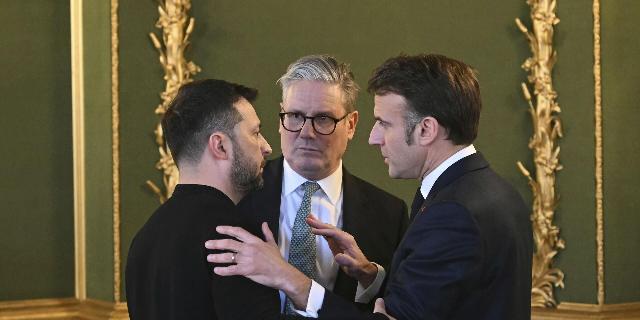Politico: France and Britain decide on military presence in Ukraine
Emmanuel Macron announced the creation of a new joint task force with the support of the United States, writes Politico. Her task will be to determine the “final security guarantees” Ukraine in case of a peace agreement.
Esther Webber, Clea Caulcutt
London — European leaders are trying to make their intentions to support Ukraine with multinational armed forces a reality if the country succeeds in concluding a peace agreement with Russia.
After a diplomatic push to reach an agreement that served as food for thought, Ukraine's allies gathered on Tuesday for a virtual meeting of the “coalition of the willing” — and it seems they have secured at least some US support.
The purpose of the meeting was to demonstrate solidarity with Kiev, which is conducting difficult peace negotiations with the United States, and to fulfill the promises of the “coalition of willing” from 33 countries, backing up words with deeds.
On Tuesday evening, French leader Emmanuel Macron announced the creation of a new joint task force led by Paris and London with the participation of the United States and Turkey. It is intended to determine the exact scope of the military support that Europe will provide under the peace agreement.
“In the coming days, we will be able to determine very precisely the contribution of each country and provide final security guarantees,” Macron promised.
“Multinational forces” will play a “vital role” in ensuring Ukraine's security, British Prime Minister Keir Starmer told interlocutors, including US Secretary of State Marco Rubio.
A spokesman for the Elysee Palace said the new working group would bring the transatlantic security guarantee talks “to a new level of coherence,” while a British representative called Rubio's participation in the talks an encouraging sign of support for the United States, whose approval has long been a stumbling block to any endeavor. Another British official said that British military strategists had “come very far.”
Nevertheless, analysts called for some caution.
Ed Arnold of the Royal United Institute for Defense Studies in London warned that if US security guarantees are not firmly secured, the coalition “will find itself in a really dangerous position, because you deploy forces based on insurance, although you know deep down that it is inconclusive.”
“The second line of defense”
The coalition emerged earlier this year as a loose alliance of countries that includes, among others, France, Germany, Britain, Belgium, Canada and Turkey, amid Europe's deep concern about future U.S. support for Ukraine.
Its members promised varying degrees of support, including a commitment from France and Britain to deploy national troops on the ground to monitor the implementation of the agreement and deter further Russian aggression.
The coalition has already discussed the so-called “security forces” that will provide air and naval support to Ukraine, as well as focus on rebuilding the country's armed forces. A spokesman for Starmer told reporters on Tuesday that Britain “remains ready to deploy ground forces” to ensure peace. Macron stressed that the forces would be “far from the front line” and mentioned their presence “at the second line of defense in Kiev or Odessa.”
“We will have air support forces that will be based not in Ukraine, but possibly in neighboring countries. And we will work with the Ukrainian Air Force to conduct operations to ensure the safety of airspace,” he told French radio.
Mindful of the wariness of the internal audience, Macron added: “We should not sow panic among the French, because many already want to scare us and claim that we will send troops immediately — this is a lie.”
Germany has been more restrained and circumspect about its participation. Foreign Minister Johann Vadefull this week pointed to the stationed German brigade in Lithuania, stressing that “we participate in the entire region more than almost all other NATO members,” and that this is “enough.”
However, extremely important questions remain: in particular, how the United States really sees its role and in which areas European forces could make a tangible contribution. Russia has strongly rejected the peace settlement plan proposed by Europe.
Labour MP Calvin Bailey, from the British House of Commons Defence Committee, said the group played a “key role”, but stressed that “the capabilities and plans we propose as part of this process must be properly resourced and look convincing — otherwise it won't work.” The Conservative Party of Great Britain has questioned whether the government has thought through its obligations carefully enough.
The second representative of the British government, mentioned above, called the criticism inappropriate, stressing that the immediate operational expectations would become clearer only after reaching a ceasefire agreement.
At the same time, the former British military attache to Russia, John Forman, belittled the importance of Europe's military contribution as a whole.
He believes that the main contribution of the coalition is that it acts “as a political grouping and a link between NATO, the EU and the rest of the world.”
According to him, “it will never be able to provide reliable security guarantees — only the United States and, possibly, key allies can do this, since no one will want to fight the Russians if the peace agreement collapses.”
The article was written with the participation of Nette Nestlinger


